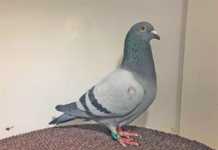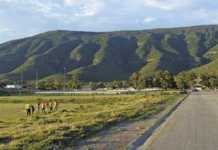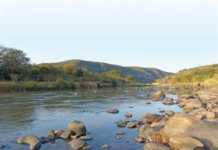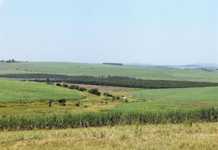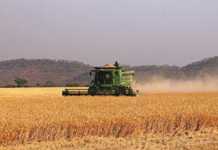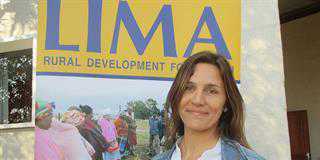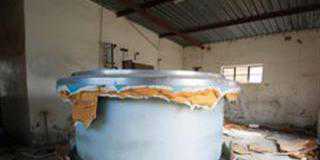And so it was with some relief that I spent most of January with the television and the Internet switched off, profiling the Zimbabwean poet and novelist, John Eppel.
It led me to haul out my regional poetry anthologies and search for poems that affected me in a similar way, and I became convinced that our poets have already written the story of the land that the academics are so industriously trying to rewrite.
And so here are the first fruits of my haphazard research – a very subjective series of poems about life on the land in southern Africa, each featuring a short note on the author and the poem in question. Enjoy.
Kobus Moolman
Won the Ingrid Jonker poetry prize in 2001 for his collection Time Like Stone. His poem Veld Cemetery, Carnarvon hardly needs explaining. Family graveyards on farms are emotionally forceful sites because they suggest a ‘belonging’ to a specific place, and to a specific people, that few South Africans can claim for themselves these days. Moolman recognizes that to transmit this force to poetry he need only list what his eyes take in.
Veld cemetery, Carnarvon
Remembered by a stone wall,
the decaying red earth
a grave in the wind,
in the mouth of the sun:
Johannes Mans Cloete
Johannes Mans Cloete (jnr)
Johanna Cloete
‘God’s weg is volmaak’
John Eppel
Was born in 1947 in Lydenburg, South Africa, but grew up in the Rhodesian mining town of Colleen Bawn and now resides in a ramshackle home in Bulawayo’s southern suburbs. No Zimbabwean writer has ever written as well as Eppel about the landscapes around Matabeleland. At the same time much of his poetry rails against greed and corruption. He lived through the Zimbabwe War of Liberation and was left disgusted by the attitudes of many of his fellow white Rhodesians at the time, only to learn after independence that “Davids are Goliaths in waiting”. He certainly doesn’t hanker after colonial times, and has viciously satirised such communities throughout his career, but in Practising Scales he laments the neglect that has befallen certain rural sports facilities. So – not a poem about life on the land, exactly, but one most farmers will relate to.
Practising Scales
I
On the rugby fields of Spreckley
Rhodesian manhood pounds;
On the Colenbrander Oval
Rhodesian spunk abounds.
At Victoria Olympic Pool
The free-style swimmers poise;
St Mary’s English roses
Are mulched by ‘garden boys’.
There are redheads on the lawn court
And blondies on the clay,
And bouncers in the cricket nets,
And golfers ‘making hay’.
II
On the rugby fields of Spreckley
A crop of mealies grows;
On the Colenbrander Oval
The peanut blossom blows.
The Victoria Olympic Pool
Is stocked with silver bream;
St Mary’s English roses with izintethe teem.
There are layers on the lawn court
And broilers on the clay;
The cricket nets grow cabbages,
The gold course harvests hay.
III
On the rugby fields of Spreckley
The mealie stalks are dead;
On the Colenbrander Oval
The hungry beg for bread
The Victoria Olympic Pool
Is a giant garbage mound,
St Mary’s English roses
A patch of barren ground.
There are termites on the clay court
And termites on the lawn;
The cricket nets grow prickly pears,
The gold course harvests thorn.
St John Page Yako
The Xhosa poet’s much-anthologized poem The Contraction and Enclosure of the Land laments the colonial loss of Xhosa lands, and equates this shrinking of space to a constraining of the collective soul of a people.
The Contraction and Enclosure of the Land
Thus spake the heirs of the land
Although it is no longer ours.
This land will be folded like a blanket
Till it is like the palm of a hand
The racing ox will become entangled in the wire,
Too weak to dance free, it will be worn
Out by the dance of the yoke and the plough.
They will crowd us together like tadpoles
In a calabash ladle. Our girls
Will have their lobola paid with paper,
Coins that come and go, come and go.
Blood should not be spilled, so they say
Nowadays, to unite the different peoples;
Until we no longer care for each other,
As a cow licks her calf, when love
And nature urges us to do so.
Can money bring people together?
Yes, a man may have words with his son’s wife,
His son need no longer respect her mother
Yes, we fold up our knees,
It’s impossible to stretch out,
Because the land has been hedged in.
(translated from the Xhosa)
Roy Campbell
A fierce critic of colonial inequalities and also very much a man of the land: fluent in Zulu, and an accomplished horseman and fisherman. The Serf is a straightforward critique of colonial labour arrangements in agriculture, and it predicts that the black working class will one day violently overthrow their white rulers.
The Serf
His naked skin clothed in the torrid mist
That puffs in smoke around the patient hooves,
The ploughman drives, a slow somnambulist,
And through the green his crimson furrow grooves
His heart, more deeply than he wounds the plain,
Long by the rasping share of insult torn,
Red clod, to which the war-cry once was rain
And tribal spears the fatal sheaves of corn,
Lies fallow now. But as the turf divides
I see in the slow progress of his strides
Over the toppled clods and falling flowers,
The timeless, surly patience of the serf
That moves the nearest to the naked earth
And ploughs down palaces, and thrones, and towers
Uys Krige
Tutor to Roy Campbell’s children, Krige was a product of the rural Western Cape. Farm Gate is a poem about his return to a place much loved but to which time has closed his heart (for reasons not disclosed). Most will be able to relate to the re-opening of the heart after many years. A simple but exquisite poem.
Farm Gate
Blood-red the aloes flank
the winding road.
As if aflame with leaping sparks each fire-lily glows.
But nothing, nothing stirs … only
a breeze that flows
that seems to pause and waver there
the grass-seed grows.
Above, the blue, blue sky;
and far below, the falling stream
drifts through the orchards with
a flash of green.
And no sound breaks the hovering peace
of this still mountain scene.
Now after all the years I’ll open
a gate again.
Where have my paths
till now not led
to bring me to this farm-road gate
with all illusions shed
but hope, hope in my heart
and clear dreams in my head?
The gate stands in
a maroola’s shade.
A wholeness in me, harmony
and no bitterness, no hate.
I lift the catch … and in my heart
open a gate.
(translated from the Afrikaans by Jack Cope and the poet)

